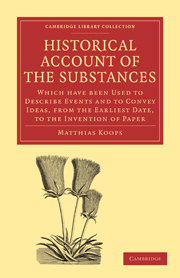Historical Account of the Substances Which have been Used to Describe Events, and to Convey Ideas, from the Earliest Date, to the Invention of Paper
Published online by Cambridge University Press: 29 August 2010
Summary
The art of Paper-making ought to be regarded as one of the most useful which has ever been invented in any age or country; for it is manifest, that every other discovery must have continued useless to society if it could not have been disseminated by manuscripts, or by printing.
Scientific men, who were neither artists nor manufacturers, have, by means of this invention, been enabled to communicate their projects, which mechanics have afterwards improved and perfected, and by this means enriched the commonwealth.
Without the use of Paper, geography and navigation must have been very incorrectly understood; the beautiful charts of the ocean so accurately laid down have established our commercial intercourse with every part of the globe with safety; at the same time that the delineations upon maps of places, rivers, and countries, are now so correct, that they enable a traveller to proceed without danger, and even predict, with certainty, the time it will require to convey him to any part of the globe.
It may be asserted, indeed, of this country, that its grandeur and commercial dignity have been greatly exalted by the invention of Paper; for it is presumed, that the superiority which distinguishes the manufactures of this Island, chiefly depends upon the liberal publications concentered from all the rest of the world, which have so greatly increased in latter years, and which are likely farther to be augmented.
- Type
- Chapter
- Information
- Publisher: Cambridge University PressPrint publication year: 2010First published in: 1800



